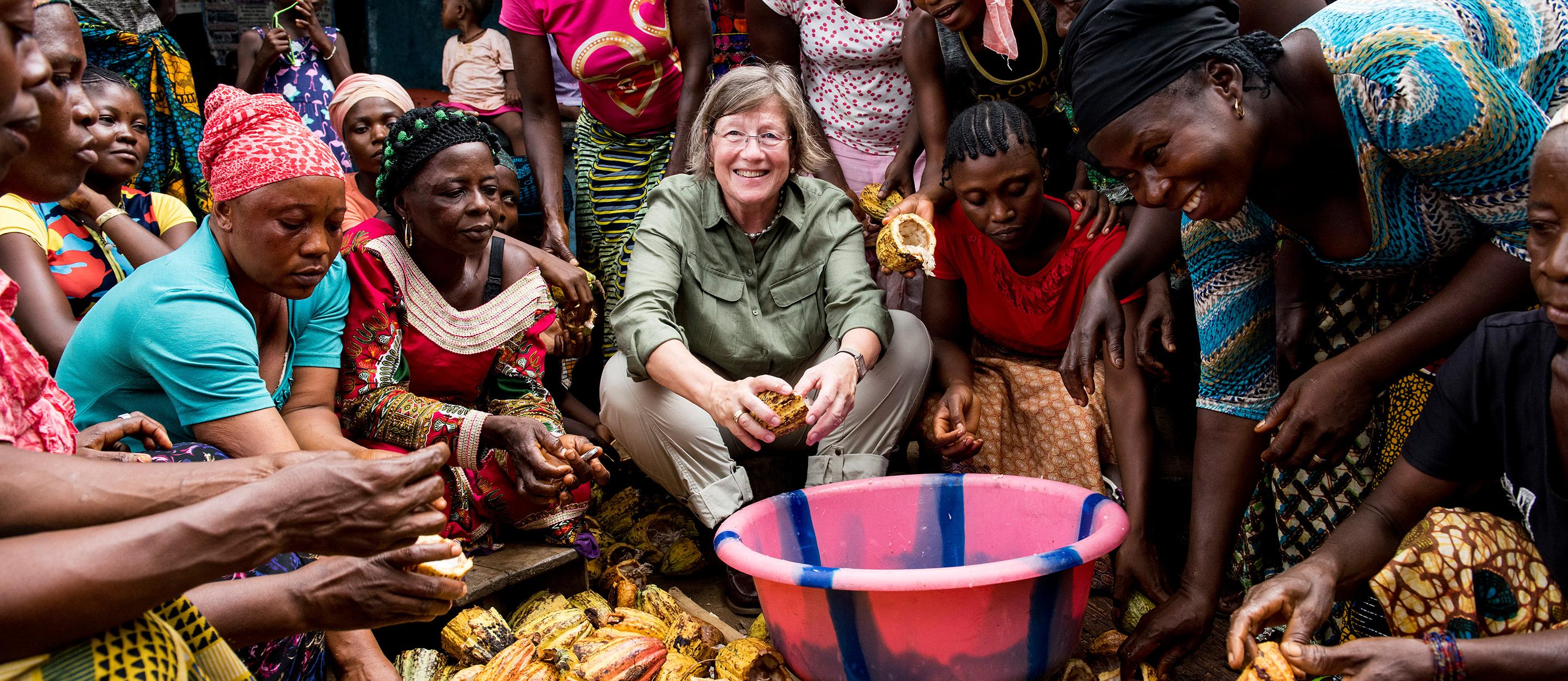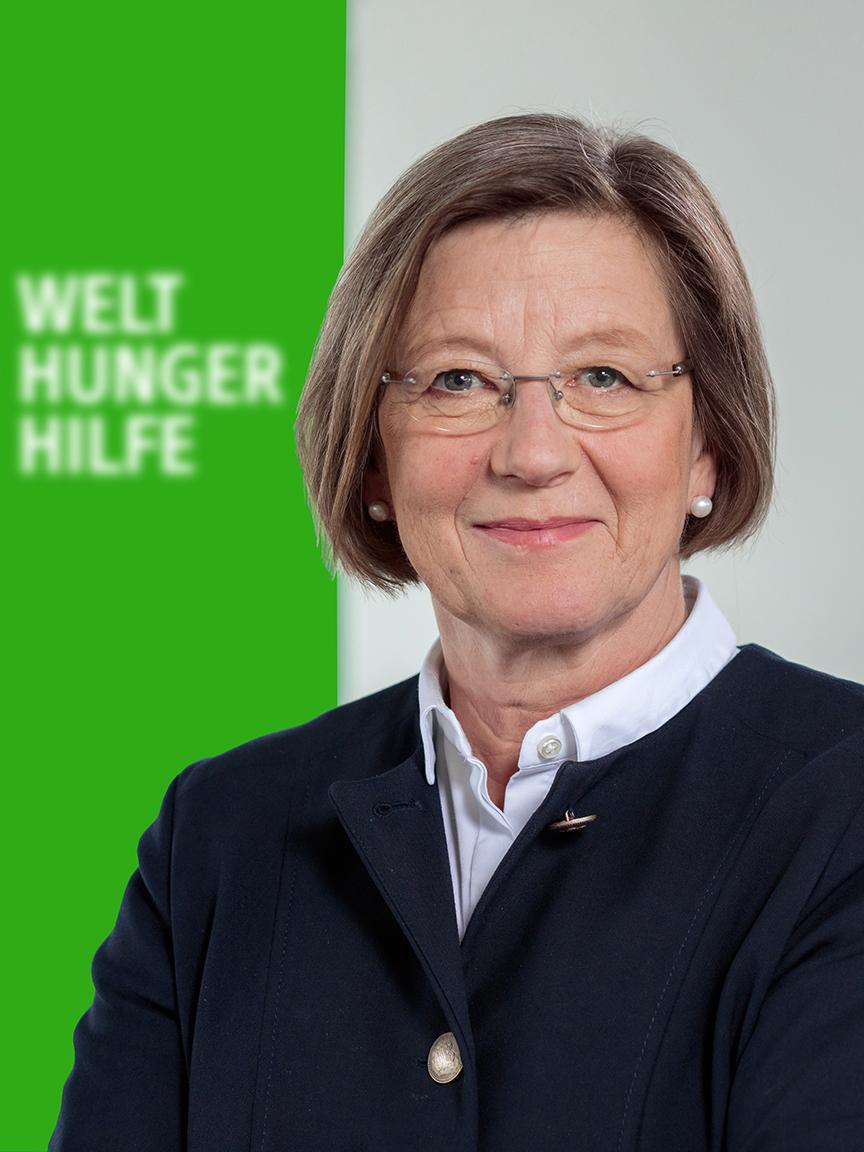GIZ works with many partners to provide efficient, effective support to people in fragile countries or regions. These include multilateral organisations such as the United Nations Refugee Agency (UNHCR), the Organisation for Economic Co-operation and Development (OECD) and non-governmental organisations (NGOs). Particular attention is given to coordinating humanitarian aid, development cooperation and peacebuilding at an early stage in what is known as the humanitarian-development-peace (HDP) nexus. This includes the integration of refugees and systematic support for host communities.
 Loeffelbein/ Welthungerhilfe
Loeffelbein/ Welthungerhilfe
‘Cuts won’t get us closer to peace or stability’
Development cooperation and humanitarian aid are important for Germany’s own stability and its role in the world, says the Chair of the Board of Welthungerhilfe. Marlehn Thieme explains how GIZ and Welthungerhilfe are achieving results together and describes the obstacles in their way.
Ms Thieme, we are seeing a worldwide increase in violent conflict and crises. What challenges do you associate with this?
Violent conflicts and crises generate more of the same. We have a record high of 120 million refugees worldwide, and we know that more than 730 million people are suffering from chronic hunger. This is alarming, because people’s living conditions are deteriorating in any case due to food and water shortages, especially in rural areas of the Global South. Added to this we have climate change, with its massive impacts on agriculture. Humanitarian aid and development cooperation face huge challenges in such fragile countries. At the same time, many donor countries are cutting their budgets for these two areas. What is more, bureaucratic restrictions are making working conditions for organisations more difficult, for example when seeking visas or work permits. Access to Gaza or Sudan, for instance, is problematic and in some cases impossible. And the safety of personnel is frequently under threat. The number of aid workers killed is higher than ever before.
What can organisations like Welthungerhilfe and GIZ do to address these challenges?
The most important thing is contact with people on the ground, especially in the remote areas where communities worst affected by poverty and hunger often live. We must prioritise their needs in order to reduce dependence on humanitarian aid and promote resilience, so that people can help themselves. Sometimes repairing an irrigation channel, mending a road or rebuilding cabins is all that’s needed. But agricultural equipment and seeds are important too, as are training measures and vocational education. They enable people to feed themselves and find work. This gives them hope and independence, and restores their confidence in the future, even after a disaster.
Welthungerhilfe and GIZ are cooperating in fragile countries like Mali and Madagascar. This involves dovetailing development approaches such as transitional development assistance, structure building and stabilisation. What stands out in their cooperation?
That the synergies in it make sense. When a state-owned organisation like GIZ and a non-governmental organisation like Welthungerhilfe (WHH) coordinate their work, the result is sustainable development, particularly in fragile contexts. There are scarcely any other large organisations doing this besides us. GIZ and WHH have incredibly strong networks in their areas of expertise. While we, for example, see and hear what is needed in remote rural communities, GIZ focuses on advising local, regional and national authorities. This enables measures to be taken that lead on from transitional development assistance to the creation of stable conditions for people to live meaningful lives.
 Papsch/Welthungerhilfe
Papsch/Welthungerhilfe
Marlehn Thieme has been Chair of the Board of Welthungerhilfe (WHH) since 2018. A lawyer by profession, she has advised the German Government as a member of the German Council for Sustainable Development.
‘If Germany significantly reduces humanitarian aid and funding for development cooperation, the message we send to the Global South and the whole world will be fatal.’
Can you give us some examples?
Cooperation like this can, for instance, mean that a large organisation such as GIZ enables state-of-the-art technology to be used to predict imminent flooding or drought. Based on this, WHH can support people in taking appropriate precautions, such as putting stores aside, building dams or ensuring livestock is safe. Another example is our cooperation on income security in Mali, where work is in short supply. While we generate short-term income opportunities that help internally displaced persons, refugees and local people keep their heads above water, GIZ works with training centres and official bodies to create better, stable prospects for this target group on the local labour market in the long term.
What do development policy actors need in order to continue achieving results like this in future, especially in fragile contexts?
We need multi-year financing commitments, not cuts. As the second largest humanitarian aid donor, Germany has a special responsibility. The moment we significantly reduce this humanitarian aid or the funding for development cooperation, the message we send to the Global South and the whole world will be fatal – that we’re no longer interested in these countries. And that we’re not a reliable partner in an emergency. If we don’t help in a crisis, more crises will follow. Post-disaster is pre-disaster. This can radicalise people at local level whose plight, and possibly whose anger too, make them susceptible to terrorist movements. Cuts will not get us closer to peace or stability – including in Germany.